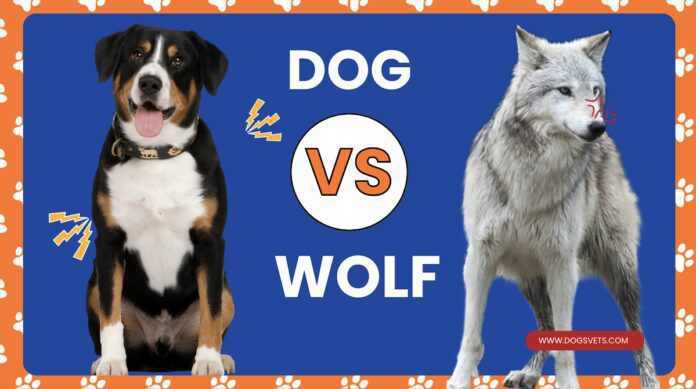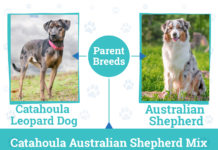Last Updated on January 16, 2024 by Dogs Vets
Wolf vs. Dog: Analyzing the Characteristics of Wild and Domestic Canines
When it comes to the world of canines, few creatures capture our imagination quite like the wolf and the dog. While both belong to the same family, Canidae, and share many similarities, they also possess distinct characteristics that set them apart.
In this article, we will delve into the fascinating world of wild and domestic canines, exploring their behaviors, adaptations, and the unique bond they share with humans.
1. Evolutionary Origins
Wolves and dogs share a common ancestor, with dogs being domesticated from wolves thousands of years ago. While wolves have retained their wild nature, dogs have undergone significant changes through selective breeding.
This process has led to the wide variety of dog breeds we see today, each with its own set of traits and characteristics.
2. Social Structure
Wolves are highly social animals, living in packs with a well-defined hierarchy. Pack members work together to hunt, raise young, and defend their territory.
Dogs, on the other hand, have adapted to live in human social structures. They form strong bonds with their human companions and often see them as part of their pack.
3. Hunting and Feeding
Wolves are skilled hunters, relying on their sharp senses and teamwork to bring down prey. They primarily feed on large ungulates such as deer and elk. Dogs, however, have adapted to a more varied diet, with many being omnivorous.
While some breeds still retain their hunting instincts, most dogs rely on humans for their food.
4. Physical Characteristics
Wolves have a lean and muscular build, designed for endurance and agility. Their thick fur helps them withstand harsh weather conditions. Dogs, on the other hand, exhibit a wide range of physical characteristics depending on their breed.

From the small and fluffy Pomeranian to the large and powerful Great Dane, dogs come in all shapes and sizes.
5. Communication
Both wolves and dogs communicate through a combination of vocalizations, body language, and facial expressions. Wolves use howls to communicate over long distances, while dogs have developed a wide range of barks, growls, and whines to convey their emotions.
Dogs have also learned to interpret human cues and gestures, making them highly adept at understanding human communication.
6. Adaptability
Wolves are highly adaptable creatures, capable of surviving in a variety of habitats, from forests to deserts.
Dogs, thanks to their domestication, have become even more adaptable. They can thrive in urban environments, adapting to the lifestyles and routines of their human companions.
7. The Human-Canine Bond
The bond between humans and dogs is a testament to the power of domestication. Dogs have become an integral part of human society, serving as companions, working animals, and even therapy animals.
This unique relationship has provided both humans and dogs with numerous benefits, including emotional support, improved physical health, and enhanced social interactions.
Summary
While wolves and dogs may share a common ancestry, their paths have diverged over time. Wolves have remained wild and adapted to survive in their natural habitats, while dogs have become our loyal companions, adapting to our way of life.
Understanding the characteristics of both wild and domestic canines not only enriches our knowledge of these remarkable animals but also deepens our appreciation for the unique bond we share with our four-legged friends.
FAQs
1. Can a wolf be domesticated like a dog?
While wolves can form bonds with humans, domesticating them like dogs is extremely challenging. Wolves have retained their wild instincts and require specialized care and handling.
2. Are all dogs descendants of wolves?
Yes, all dogs are descendants of wolves. Through selective breeding, humans have shaped the traits and characteristics of dogs over thousands of years.
3. Do wolves make good pets?
Wolves are not suitable as pets due to their wild nature and specialized needs. They require vast amounts of space, proper socialization, and expert care.
4. Can dogs survive in the wild?
While some dogs may possess survival instincts, most domesticated dogs rely on humans for their food and shelter. Without human care, they may struggle to survive in the wild.
5. Can wolves and dogs interbreed?
Yes, wolves and dogs can interbreed and produce offspring known as wolf-dog hybrids. However, the resulting hybrids can exhibit a wide range of traits and behaviors.
6. Are wolves dangerous to humans?
Wolves are generally shy and avoid human contact. However, like any wild animal, they can become aggressive if they feel threatened or cornered.
7. Can dogs understand human emotions?
Yes, dogs have a remarkable ability to sense and understand human emotions. They can provide comfort and support during times of distress.
Remember to add verified references or source embedded URLs links at the end of the article.

















